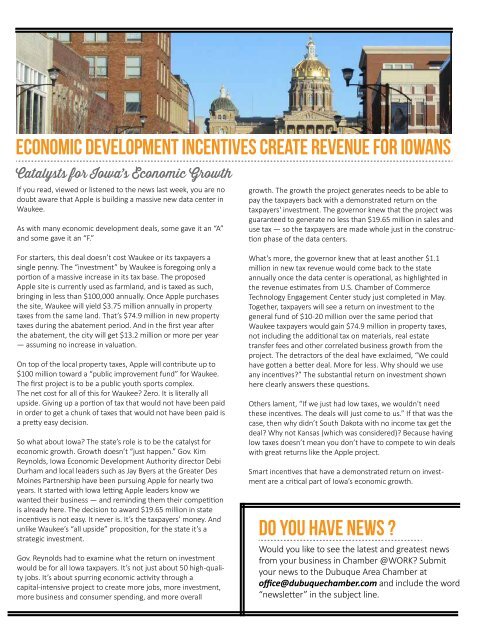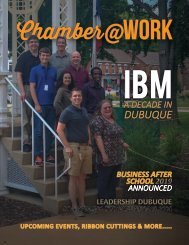You also want an ePaper? Increase the reach of your titles
YUMPU automatically turns print PDFs into web optimized ePapers that Google loves.
ECONOMIC DEVELOPMENT INCENTIVES CREATE REVENUE FOR IOWANS<br />
Catalysts for Iowa’s Economic Growth<br />
If you read, viewed or listened to the news last week, you are no<br />
doubt aware that Apple is building a massive new data center in<br />
Waukee.<br />
As with many economic development deals, some gave it an “A”<br />
and some gave it an “F.”<br />
For starters, this deal doesn’t cost Waukee or its taxpayers a<br />
single penny. The “investment” by Waukee is foregoing only a<br />
portion of a massive increase in its tax base. The proposed<br />
Apple site is currently used as farmland, and is taxed as such,<br />
bringing in less than $100,000 annually. Once Apple purchases<br />
the site, Waukee will yield $3.75 million annually in property<br />
taxes from the same land. That’s $74.9 million in new property<br />
taxes during the abatement period. And in the first year after<br />
the abatement, the city will get $13.2 million or more per year<br />
— assuming no increase in valuation.<br />
On top of the local property taxes, Apple will contribute up to<br />
$100 million toward a “public improvement fund” for Waukee.<br />
The first project is to be a public youth sports complex.<br />
The net cost for all of this for Waukee? Zero. It is literally all<br />
upside. Giving up a portion of tax that would not have been paid<br />
in order to get a chunk of taxes that would not have been paid is<br />
a pretty easy decision.<br />
So what about Iowa? The state’s role is to be the catalyst for<br />
economic growth. Growth doesn’t “just happen.” Gov. Kim<br />
Reynolds, Iowa Economic Development Authority director Debi<br />
Durham and local leaders such as Jay Byers at the Greater Des<br />
Moines Partnership have been pursuing Apple for nearly two<br />
years. It started with Iowa letting Apple leaders know we<br />
wanted their business — and reminding them their competition<br />
is already here. The decision to award $19.65 million in state<br />
incentives is not easy. It never is. It’s the taxpayers’ money. And<br />
unlike Waukee’s “all upside” proposition, for the state it’s a<br />
strategic investment.<br />
Gov. Reynolds had to examine what the return on investment<br />
would be for all Iowa taxpayers. It’s not just about 50 high-quality<br />
jobs. It’s about spurring economic activity through a<br />
capital-intensive project to create more jobs, more investment,<br />
more business and consumer spending, and more overall<br />
growth. The growth the project generates needs to be able to<br />
pay the taxpayers back with a demonstrated return on the<br />
taxpayers' investment. The governor knew that the project was<br />
guaranteed to generate no less than $19.65 million in sales and<br />
use tax — so the taxpayers are made whole just in the construction<br />
phase of the data centers.<br />
What’s more, the governor knew that at least another $1.1<br />
million in new tax revenue would come back to the state<br />
annually once the data center is operational, as highlighted in<br />
the revenue estimates from U.S. Chamber of Commerce<br />
Technology Engagement Center study just completed in May.<br />
Together, taxpayers will see a return on investment to the<br />
general fund of $10-20 million over the same period that<br />
Waukee taxpayers would gain $74.9 million in property taxes,<br />
not including the additional tax on materials, real estate<br />
transfer fees and other correlated business growth from the<br />
project. The detractors of the deal have exclaimed, “We could<br />
have gotten a better deal. More for less. Why should we use<br />
any incentives?” The substantial return on investment shown<br />
here clearly answers these questions.<br />
Others lament, “If we just had low taxes, we wouldn’t need<br />
these incentives. The deals will just come to us.” If that was the<br />
case, then why didn’t South Dakota with no income tax get the<br />
deal? Why not Kansas (which was considered)? Because having<br />
low taxes doesn’t mean you don’t have to compete to win deals<br />
with great returns like the Apple project.<br />
Smart incentives that have a demonstrated return on investment<br />
are a critical part of Iowa’s economic growth.<br />
Do you have news ?<br />
Would you like to see the latest and greatest news<br />
from your business in Chamber @WORK? Submit<br />
your news to the Dubuque Area Chamber at<br />
office@dubuquechamber.com and include the word<br />
“newsletter” in the subject line.
















